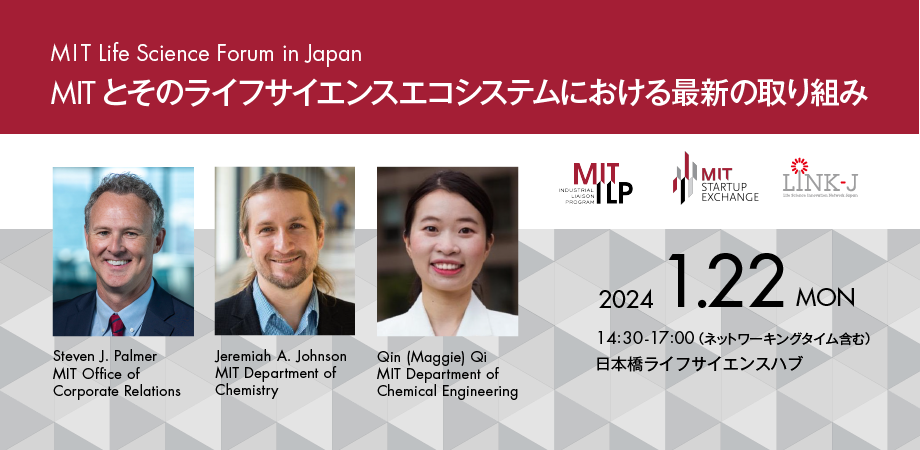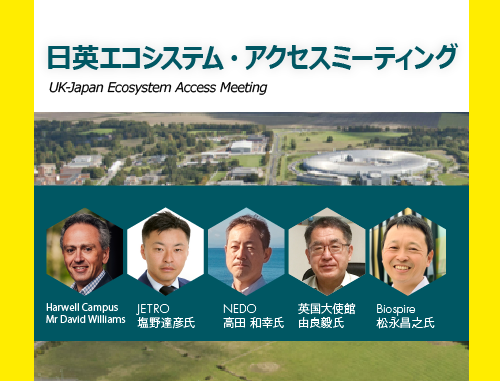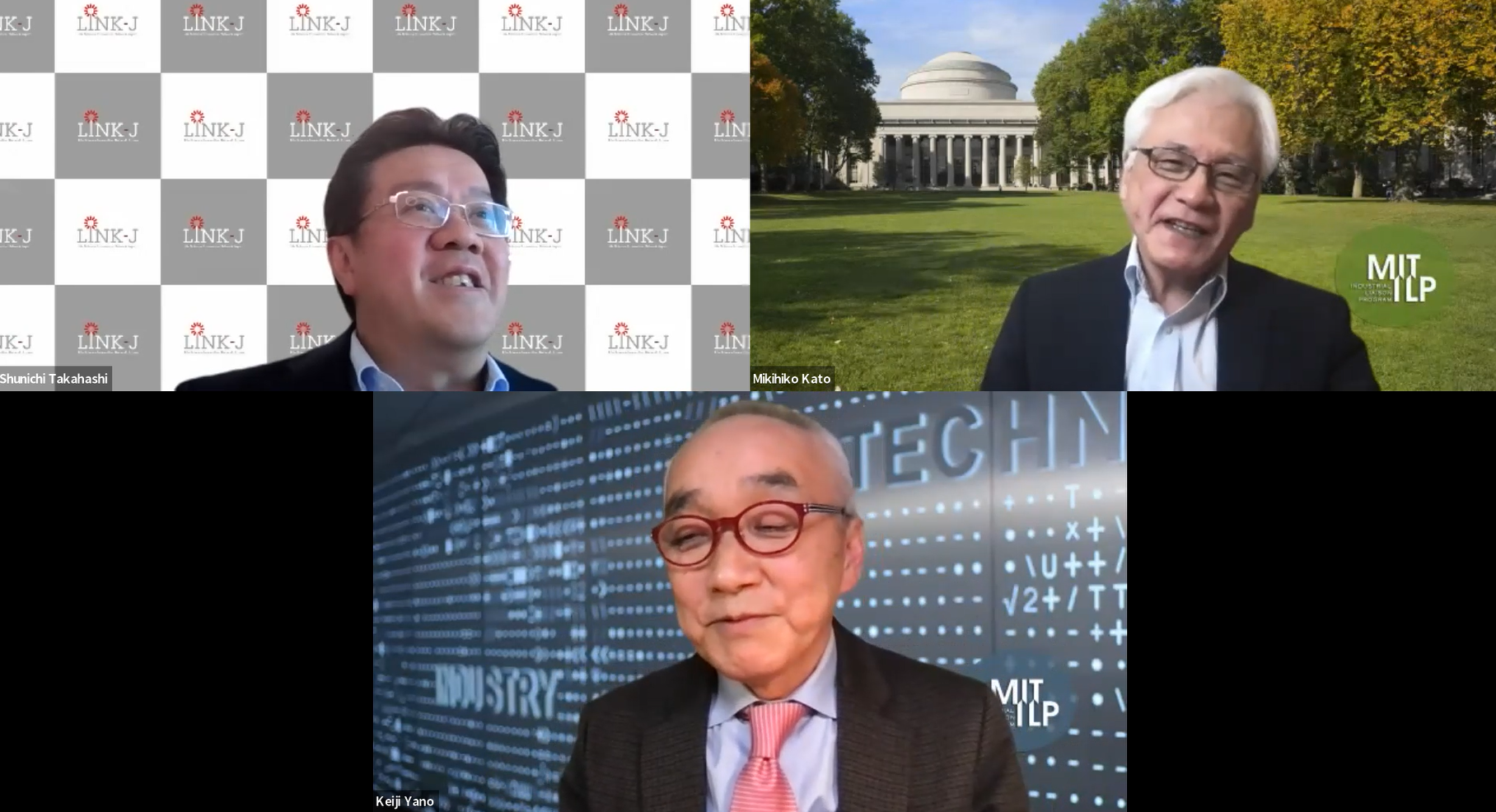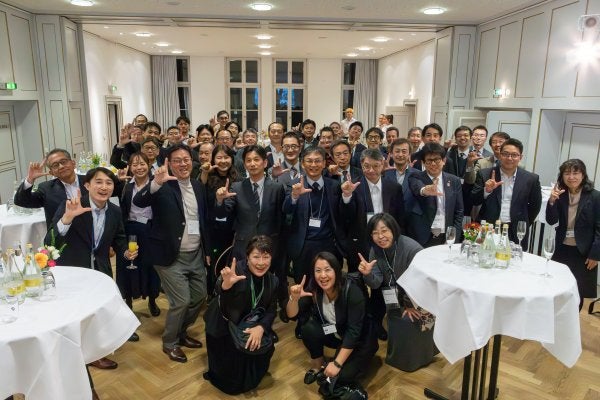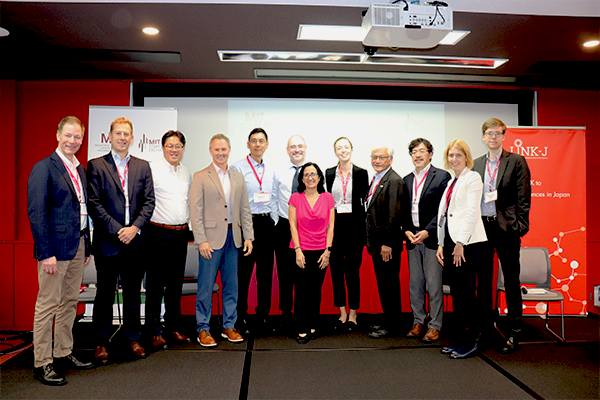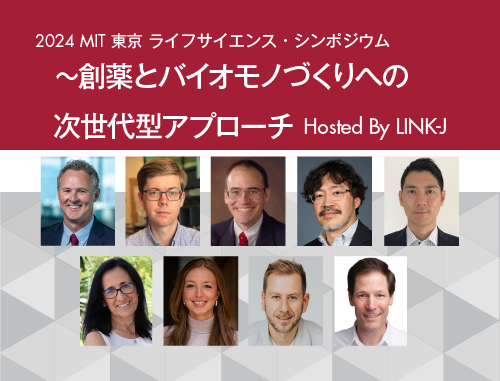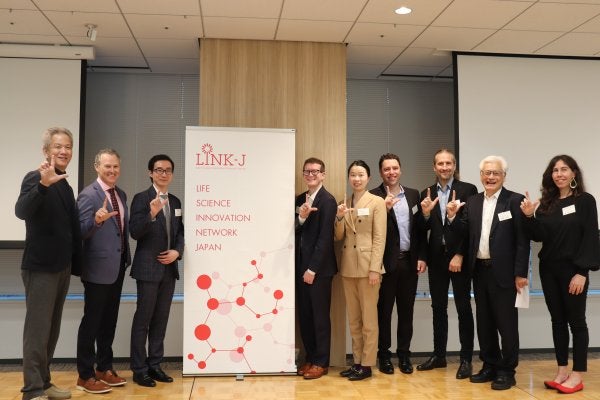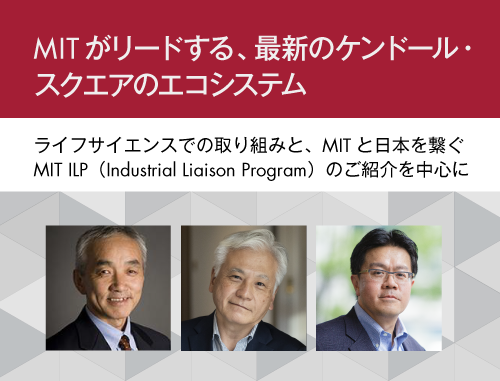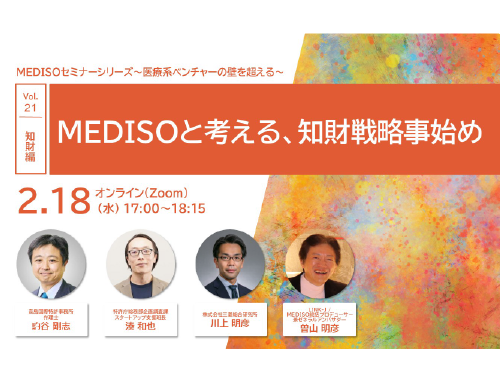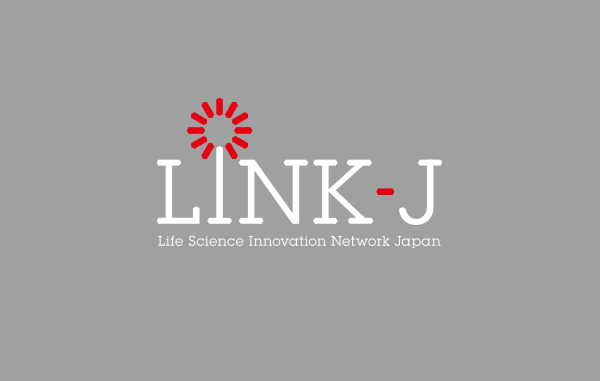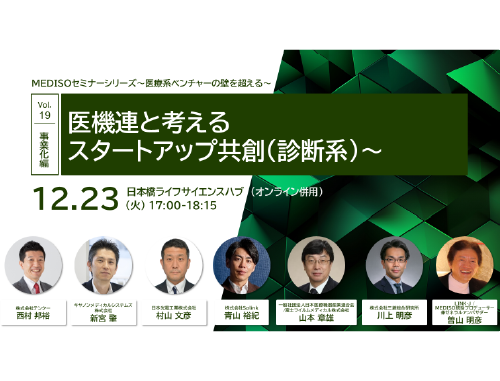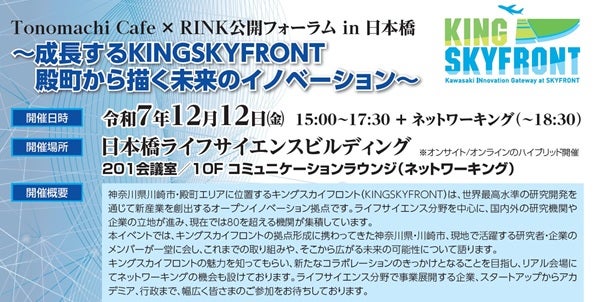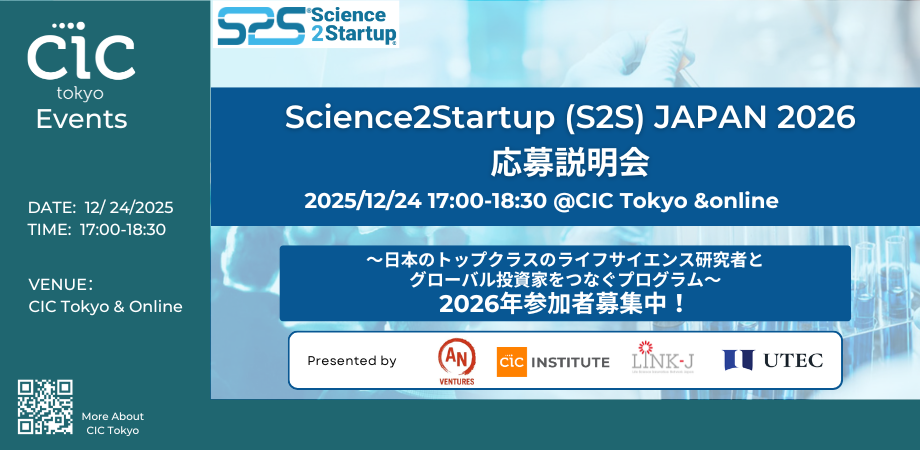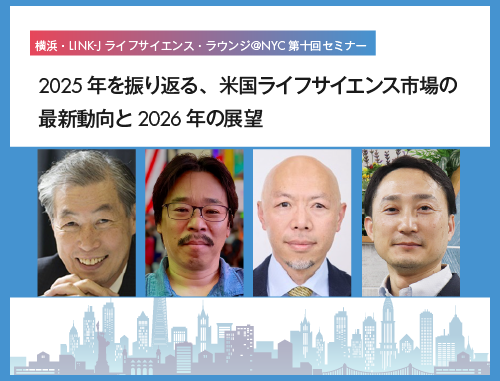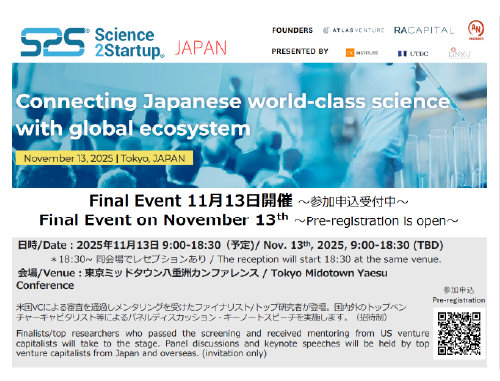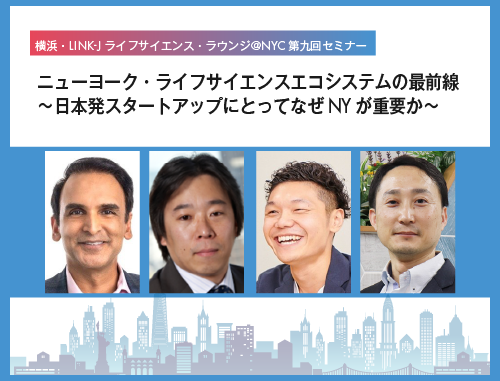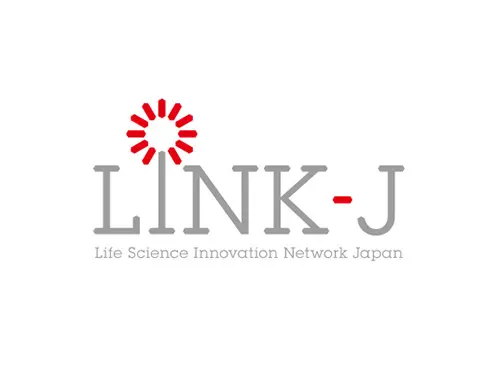マサチューセッツ工科大学 (MIT) とその周辺のボストンエリアは「ライフサイエンスのメッカ」として知られ、エコシステムが近年急速に拡大・発展しています。
今回は、2024 MIT Japan Conference に合わせて来日するライフサイエンス系の研究者2名とMIT発スタートアップ3社に日本橋にお越しいただき、最先端の研究についての講演とピッチセッションを開催します。ジョンソン教授からは抗体医薬に関する研究、シー准教授からはプレシジョン・メディスンに関する研究につき講演いただき、引き続いてスタートアップ3社からのピッチが行われます。
また、これらの研究や起業をサポートしている、MIT Office of Corporate Relations (OCR) の取り組みもご紹介します。このオフィスは、Industrial Liaison Program (ILP) とStartup Exchange Programで構成され、MITと産業界の連携と協働をサポートしています。
MITエコシステムの最新情報に触れ、ライフサイエンス分野の未来を共に考える貴重な機会を楽しみください。MITやMIT発スタートアップとの連携に興味のある方や、国外の最先端の研究やスタートアップの動向に関心がある方など、多くの皆様のご参加をお待ちしています。
使用言語:英語
※同時通訳なし
※現地会場のみ、オンライン配信なし
*MIT OCRは、1月23日に年次カンファレンス「2024 MIT Japan Conference」を開催します。ご興味のある方は1月19日までにLINK-Jにメールでお知らせください。担当者より参加方法を別途ご連絡させていただきます。
申込締切
2024年1月22日(月)10:00まで
プログラム
| 日本時間 | 内容 |
| 14:30-14:35 |
Opening ご挨拶: 高橋 俊一(LINK-J事務局長) |
| 14:35-14:40 |
ご挨拶: Steven J Palmer, Director, MIT Corporate Relations |
| 14:40-15:10 |
講演1 "Enabling a New Generation of Dual-Targeted Antibody–Drug Conjugates with Bottlebrush Prodrugs" Jeremiah A. Johnson, Professor, MIT Department of Chemistry |
| 15:10-15:40 |
講演2 "Microfluidic Flow Dynamics for Health: Bridging Experimental and Computational Approaches for Precision Medicine" Qin (Maggie) Qi, James R. Mares ‘24 Career Development Chair Assistant Professor, MIT Department of Chemical Engineering |
| 15:40-15:50 |
Networking Break |
| 15:50-15:55 |
Startup Exchange Programのご紹介 Ariadna Rodenstein, Program Manager, MIT Startup Exchange Program |
| 15:55-16:05 |
スタートアップピッチ1“Genomic medicines, delivery, ML-guided” |
| 16:05-16:15 |
スタートアップピッチ2“Room temperature storage of nucleic acids” |
| 16:15-16:25 |
スタートアップピッチ3“Next-generation POC diagnostics for rapid, on-site testing” |
| 16:25-17:00 |
質疑応答・ネットワーキング |
| 17:00 |
Closing |
登壇者略歴
 Steven J Palmer, Director, MIT Corporate Relations
Steven J Palmer, Director, MIT Corporate Relations
Steve Palmer is a Director within MIT’s Office of Corporate Relations. Steven comes to OCR with many years of experience building relationships, advancing diplomacy, and seeking new business initiatives in both the public and private sectors. He has spent his career highlighting and translating technological issues for policy makers, engineers, analysts, and business leaders. Steven has worked in government, industry, and academia in the U.S. and abroad. He is also an Executive Coach at MIT Sloan and Harvard Business School. Steven earned his Bachelor of Science at Northeastern University, and his M.B.A. at MIT Sloan where he was in the Fellows Program for Innovation and Global Leadership.
 Jeremiah A. Johnson, Professor, MIT Department of Chemistry
Jeremiah A. Johnson, Professor, MIT Department of Chemistry
Professor Jeremiah Johnson conducted undergraduate research with Prof. Karen L. Wooley at Washington University in St. Louis where he received a B.S. in biomedical engineering with a second major in chemistry. He then received a PhD in chemistry at Columbia University under the mentorship of Prof. Nicholas J. Turro and Prof. Jeffrey T. Koberstein. In 2011, following a Beckman Postdoctoral Fellowship at California Institute of Technology under the guidance of Professors David A. Tirrell and Robert H. Grubbs, he moved to MIT where he is now a Professor of Chemistry. He is also a member of the MIT Program for Polymers and Soft Matter (PPSM), the Koch Institute for Integrative Cancer Research, and the Broad Institute of MIT & Harvard. He is a Co-Founder of Window Therapeutics Inc. and Electrolyte Solutions Inc., both of which are based on technologies (co)developed by his laboratory at MIT.
Jeremiah received a 2019 ACS Cope Scholar Award, the 2018 Macromolecules-Biomacromolecules Young Investigator Award, the 2018 Nobel Laureate Signature Award for Graduate Education, a Sloan Research Fellowship, the Air Force Young Investigator Award, the Thieme Journal Award for Young Faculty, the DuPont Young Professor Award, the 3M Non-tenured Faculty Award, and an NSF CAREER award. In 2019 and 2023 he was named as a Finalist for the Blavatnik Award for Young Scientists. In recognition of his teaching, he was awarded the 2018 MIT School of Science Undergraduate Teaching Prize. The Johnson research group is focused on the development of methods and strategies for macromolecular synthesis and surface functionalization.
 Qin (Maggie) Qi, James R. Mares ‘24 Career Development Chair Assistant Professor, MIT Department of Chemical Engineering
Qin (Maggie) Qi, James R. Mares ‘24 Career Development Chair Assistant Professor, MIT Department of Chemical Engineering
Dr. Qin (Maggie) Qi is the James R. Mares ’24 Career Development Chair Assistant Professor in Chemical Engineering at the Massachusetts Institute of Technology. Her research applies fluid mechanics and transport principles to engineer soft materials for medical applications. She received her Ph.D. in chemical engineering with Prof. Eric Shaqfeh at Stanford University in 2018, where she won the T.S. Lo Fellowship and Stanford Graduate Fellowship. There, she also collaborated with the Royal College of Surgeons and BD Biosciences to develop a diagnostic device for various bleeding disorders. She then conducted postdoctoral research with Prof. Samir Mitragotri at the Wyss Institute of Biologically Inspired Engineering at Harvard University, where she developed a subcutaneous-tissue-on-a-chip model for pharmacokinetic testing (licensed to Sanofi). She was elected to the inaugural class of MIT Rising Stars in Chemical Engineering. She recently received the FY23 MIT research support committee award and was named a Science Influencer Mentor sponsored by the FDA.
Abstract
Jeremiah A. Johnson
"Enabling a New Generation of Dual-Targeted Antibody-Drug Conjugates with Bottlebrush Prodrugs"
Antibody–drug conjugates (ADCs) have emerged as one of the most exciting platforms for cancer therapy; however, their need for highly potent cytotoxic payloads, and the inevitability that most ADC molecules do not reach target cells, limits the scope of ADC payload mechanisms of action and leads to off-site toxicity. Here, a novel platform that breaks these limitations will be introduced. Our approach enables the use of a much broader range of selective payloads, e.g., molecularly targeted payloads, and payload combinations in the context of ADCs, achieving mechanisms of action that are orthogonal/complementary to existing ADCs and allowing for new applications of molecularly targeted payloads by virtue of an expanded therapeutic window.
Qin (Maggie) Qi
"Microfluidic Flow Dynamics for Health: Bridging Experimental and Computational Approaches for Precision Medicine"
Microscopic flows in a biological environment play a remarkable role in regulating human health, from disease causes to driving forces behind diagnostics and therapeutics. Its influence on other living organisms also has far-reaching impact in energy and environment. Such flow-induced dynamic effects, however, are often overlooked in engineering designs due to limitations in existing research toolsets. As a result, conventional biological and medical research face various challenges in accuracy, cost and translational success. In this talk, I will present our group’s work on applying fluid mechanics principles to design biomaterials, cell therapies and pharmacological models. We develop both experimental (in vitro) and computational tools mimicking a dynamic biological flow environment. The combination of these new tools enables us to reduce the use of animal models and shorten the preclinical research timeline while achieving tailor-made design outcomes towards precision medicine.
参加費
無料
定員
100名
主催
一般社団法人ライフサイエンス・イノベーション・ネットワーク・ジャパン(LINK-J)、MIT Office of Corporate Relations
お問い合わせ先
E-mail : contact@link-j.org
